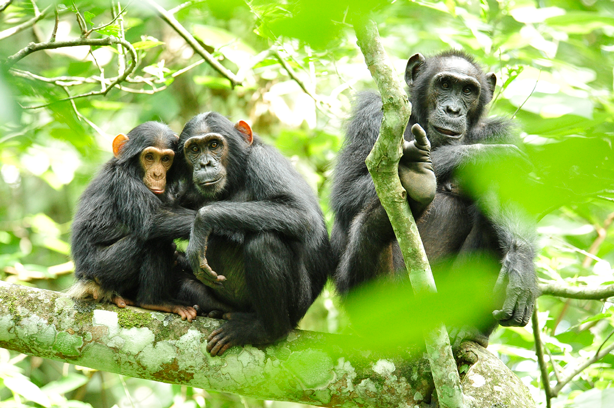Print Edition: October 16, 2013

The Science
A new study has found that, once again, our nearest relatives are far more similar to humans than we might expect.
Researchers from the University of Vienna and the University of Zurich studied the personalities of 38 captive chimpanzees in DierenPark Amersfoort Zoo and Royal Burgers’ Arnhem Zoo to determine the factors that predict friendship, other than kinship. What they found was that, like humans, chimpanzee friends tended to be similar in personality.
The chimpanzees had their personalities assessed according to six social and non-social personality dimensions: sociability (i.e. frequency of giving/receiving grooming, number of individuals in close proximity), positive affect (i.e. frequency of hugs, kisses, initiating play), anxiety (i.e. self-scratching), grooming equity (i.e. number of grooming partners), exploration persistence (i.e. time spent with new objects and puzzles), and boldness (i.e. approaching a model predator). Over nine months, incidences of contact sitting were then tracked, as sitting in contact is a sign of friendship among chimpanzees.
What researchers found is that chimpanzees that sit together frequently rate similarly on sociability, grooming equity, and boldness. Sociability and boldness were compared to the human trait extroversion, which also predicts friendship in humans.
“We found that, especially among unrelated friends, the most sociable and bold individuals preferred the company of other highly sociable and bold individuals,” said researcher Jorg Massen in Science Daily, “whereas shy and less sociable ones spent time with other similarly aloof and shy chimpanzees.”
“We suggest that similarity in these personality traits is adaptive, because it may enhance partner reliability in cooperative interactions, including grooming, cooperative defence, and coalitionary support in aggression. Similarity in these characteristics may be especially relevant in bonds among unrelated individuals,” researchers Jorg Massen and Sonja Koski stated in their article “Chimps of a feather sit together: chimpanzee friendships are based on homophily in personality” in Evolution and Human Behaviour.
“Our results resemble homophily found in human friendships. This suggests that the mechanisms of friendship formation and/or maintenance are similar in ourselves and our closest living relatives.”
You, me, and UFV
In the war of proverbs, it appears that “birds of a feather flock together” trumps “opposites attract.” It is important to note, however, that personality homophily works only on certain levels with both humans and chimps – for instance, there is no friendship correlation of similarities in chimp anxiety, nor the human trait neuroticism with which it is equated.
There’s a lot of common sense to this, and not just for evolutionary adaption. Human friendships thrive on similarity in interests – for instance, extroverts would enjoy having a friend who wants to go out with them and try new things, whereas introverts might prefer a friend who is okay chilling at home. However, two neurotic friends are probably going to drive each other crazy.
This isn’t a hard and fast rule for humans, as it’s pretty easy for most of us to think of friends we have who are dissimilar. But humans have an undoubtedly more complicated social structure – often friends who are dissimilar have been friends since childhood, friends because their spouses are friends, or friends because work forced them into close regular contact. With chimpanzees, these kinds of considerations are eliminated.
This offers a lot of insight into some of the struggles found in human relationships. Some areas of perpetual disagreement probably arise from fundamental differences in personality – you may resent someone for not being more extroverted, but that can’t necessarily be changed. Such a relationship will require compromise, whereas friendships that require less work are more likely to occur between similar people.
Perhaps a new proverb should be coined: “Opposites can put up with each other, but birds of a feather get along together.”


